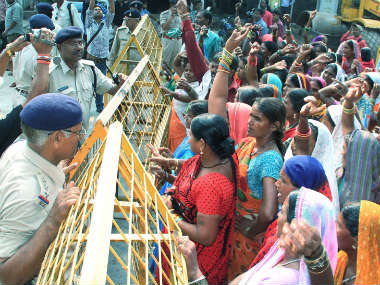Over 10 women have died and 60 are struggling for their lives after a mass sterilisation camp in Bilaspur, Chhattisgarh botched up the surgeries. According
to reports , the Chhattisgarh government has suspended four doctors for medical negligence in the case and an FIR has also been registered against the doctors. In case of the Chhattisgarh tragedy, many women were convinced by health-care workers to undergo the surgery, even though their families were reluctant. As this Indian Express report notes, one of the victims Nem Bai had just given birth to a child. Nem Bai’s brother-in-law Mahesh Suryavanshi told the paper, “She was taken without our permission. We told them repeatedly that she has just given birth, but they did not listen. Bole kuch nahi hoga, chhota sa operation hai. Bhed bakriyon ki tarah dhakelte hue le aaye unhen (They said nothing would happen, it was a minor operation. They herded them like cattle and took them)." Laxmi Sahu, who is critical and has been admitted to the Apollo hospital was anaemic, while another victim Manorama had diabetes - evidently the doctors didn’t bother to look at the medical histories of the women, some of whom had asthma, heart problems as well. [caption id=“attachment_1799077” align=“alignleft” width=“380”] Women protesting outside the Chhattisgarh Health Minister’s office. PTI[/caption] According to reports, the women had been discharged on Saturday after being given medicines. However, within 24 hours of the surgery, many women complained of vomiting and abdominal pain. Preliminary examinations suggested that a septic infection may be the cause of death in many cases. While health officials have denied any negligence, the news reports and families’ statements tell another story. Too many surgeries were carried out in one day and obviously without any regard for medical procedure. While men are reluctant to get the surgery done due to rumours of impotency even though it is a relatively simple procedure with zero-side-effects, women on the other hand are still facing the brunt of these campaigns despite the fact that tubectomies carry much more post-surgery complications, even if done properly.
Studies have shown that since
tubectomies involve abdominal surgery and have side-effects like reactions to anaesthesia, bleeding, susceptibility to septicaemia, etc. It is unlikely that after despite these deaths that such camps will be stopped or even steps taken to review them. After all, when the lives of poor women are at stake, neither the government nor society, care for too long.
In case of the Chhattisgarh tragedy, many women were convinced by health-care workers to undergo the surgery, even though they were medically unfit.
Advertisement
End of Article


)

)
)
)
)
)
)
)
)



